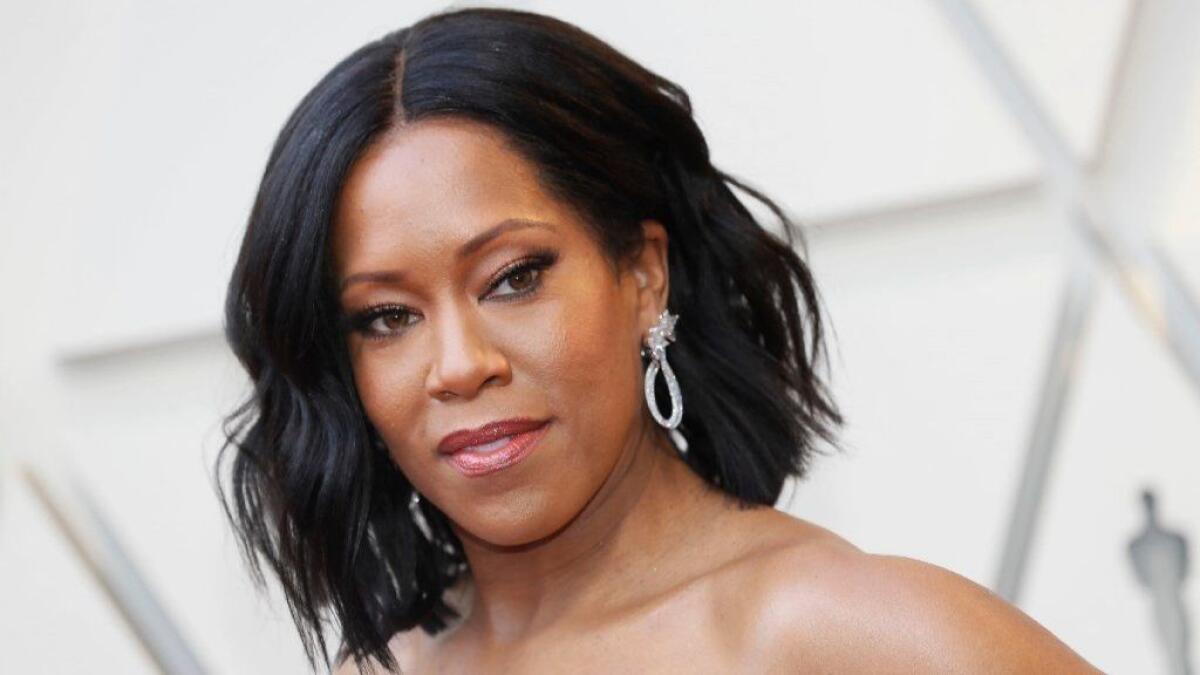Oscars 2019: Regina King wins first Academy Award for ‘If Beale Street Could Talk’

- Share via
From the time “If Beale Street Could Talk” premiered at the Toronto International Film Festival in October, Regina King has seemed the rightful favorite for the Oscar.
King won the Oscar for supporting actress for her role as a family matriarch in filmmaker Barry Jenkins’ adaptation of the novel by James Baldwin.
In accepting the award, King said: “To be standing here representing one of the greatest artists of our time, James Baldwin, is a little surreal. James Baldwin birthed this baby, Barry nurtured her, surrounded her with so much love and support.”
She acknowledged her mother, Gloria King, who was in the audience, while saying, “So it’s appropriate for me to be standing here because I’m an example of what it looks like when support and love is poured into someone. Mom, I love you so much. Thank you for teaching me that God is always leaning, always has been leaning in my direction.”
She thanked her fellow nominees, Amy Adams, Marina de Tavira, Emma Stone and Rachel Weisz, referring to them as “my sisters in art.”
King concluded her remarks by saying, “God is good, all the time.”
She won a Golden Globe and a Spirit Award on the way to Oscar, also earning numerous critics prizes, including being recognized by the Los Angeles Film Critics Association, the New York Film Critics Circle and the National Society of Film Critics.
The main bump in her trajectory was when she was not nominated for a SAG award or a BAFTA award, but that obviously proved to be less of an issue than awards prognosticators might have made out.
King was first seen during a five-year run on the sitcom “227,” and then moved on to feature films, including her movie debut in “Boyz n the Hood” and parts in “Friday,” “A Thin Line Between Love and Hate,” “Ray” and “Jerry Maguire.”
She made a conscious decision to pull back from features and dedicate herself to TV to allow more time for raising her son. That led to five years on the police drama “Southland,” which led to a groundswell of critical support.
King then picked up two Emmys for the anthology series “American Crime” and another Emmy for the limited series “Seven Seconds,” becoming an unexpected awards powerhouse. Other credits include “The Leftovers,” “Shameless” and “The Strain.”
After first directing while on “Southland,” King had gone on to a prolific television directing career as well, including episodes of “Scandal,” “Shameless,” “This Is Us” and “The Good Doctor.” She has also been in production on Damon Lindeloff’s anticipated and highly secretive adaptation of “Watchmen” for HBO.
2019 Oscars: See the full list of winners and nominees »
King garnered significant attention when in her speech accepting the Golden Globe for supporting actress for her role in “Beale Street” she made a gender parity pledge, saying, “in the next two years, everything that I produce, I am making a vow, and it’s going to be tough, to make sure that everything that I produce, that it’s 50% women.”
To a huge ovation from the audience, she added, “And I just challenge anyone out there who is in a position of power — not just in our industry, in all industries — I challenge you to challenge yourselves and stand with us in solidarity and do the same.”
Earlier this year, Jenkins spoke about why he thinks audiences have responded so strongly to King’s performance.
“Regina has played so many different women over the course of her career, so many different black women, and Regina is a person who really gets into her characters,” he said. “I think when people see Regina in this film, they see their mother, they see their grandmother. And I think that’s because Regina is bringing so many of these other experiences to this role.
“And ultimately, despite the fact she is this person who shows so much strength throughout much of the film,” Jenkins added, “when she turns to show her burden, to reveal her vulnerability, you feel that. It’s what Regina does so well; she’s an empath.”
More to Read
Only good movies
Get the Indie Focus newsletter, Mark Olsen's weekly guide to the world of cinema.
You may occasionally receive promotional content from the Los Angeles Times.










